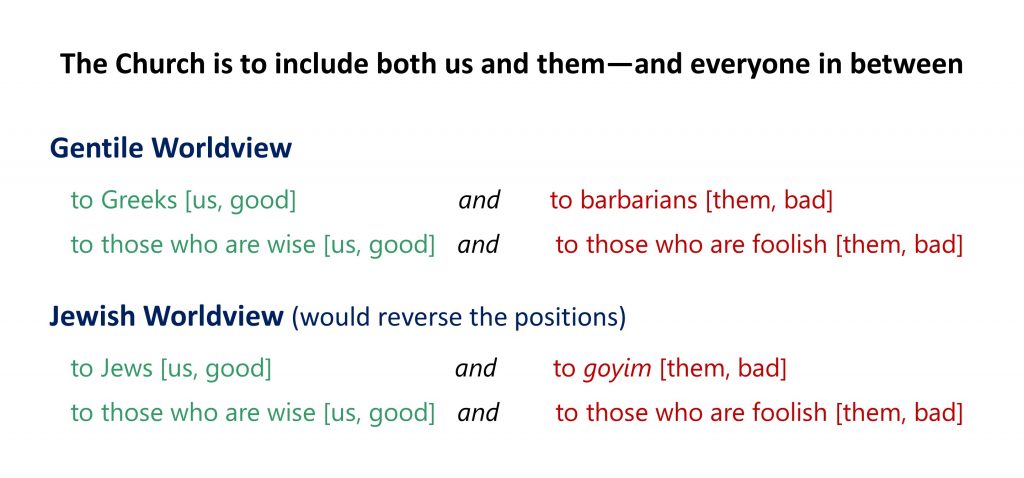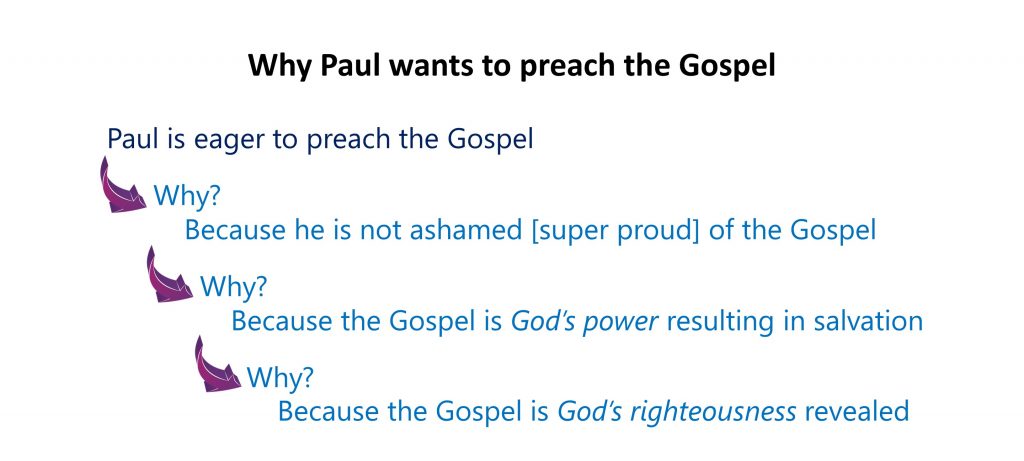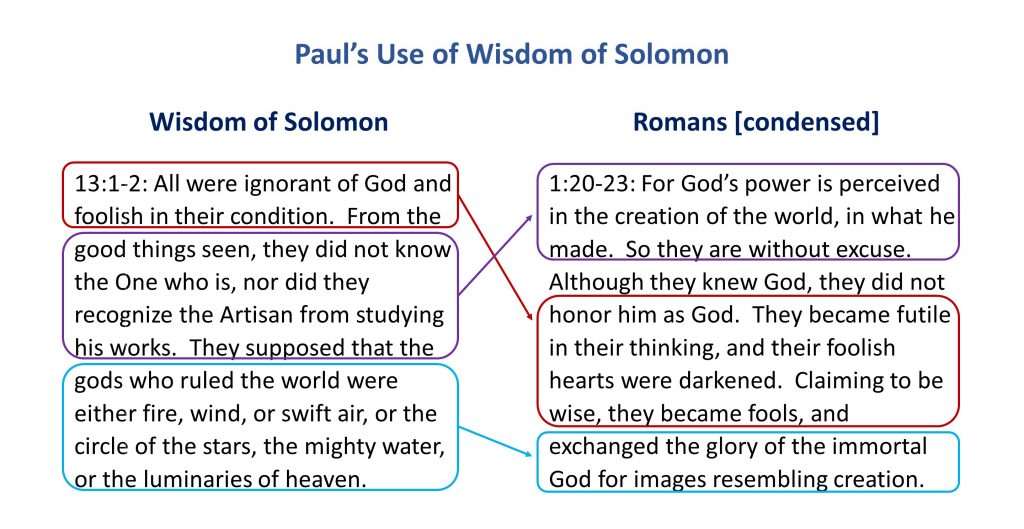 Paul writes a letter to the church at Rome to correct ideas that the Jews and Gentiles brought with them into the Church. The Jews brought a work righteousness, displayed by following Old-Covenant rituals (Law). The Gentiles brought their current-day mores, thinking that grace allowed them to continue in sin.
Paul writes a letter to the church at Rome to correct ideas that the Jews and Gentiles brought with them into the Church. The Jews brought a work righteousness, displayed by following Old-Covenant rituals (Law). The Gentiles brought their current-day mores, thinking that grace allowed them to continue in sin.
After the faintest of praise for them, Paul used a series of three statements, stating what he intended and why. His first intention was to visit Rome. Why? To impart some spiritual gift to them and strengthen them. We now get to his other two statements.
Paul’s Intentions and His Reasons Why: #2
Read Romans 1:13-14
- What does Paul intend? (vs. 13a)
- What does Paul’s use of the passive voice of not being able to visit them reveal about what he understands as God’s plans for him?
- Why does he want to visit Rome? (13b-14)
“among”: Greek, en, a preposition with several meanings, best understood by context. Here, en means “in your area” or “in your midst.” For Paul follows his use of en with “as well as the rest of the Gentiles,” even moving outward from “your area”: from Greeks to barbarians. Barbarians (Greek, barbaros) were Gentiles who didn’t speak the Greek language, which sounded like “bar bar.”
- What is Paul saying to both the Jewish and Greek-speaking Christians at Rome?
Paul undercuts both Jewish and Gentile (Greek) worldviews. He does so by using the connotations that existed in both Greek and Hebrew. Now, the Jewish Christians then were no longer fluent in Hebrew, but their prejudicial ideas from Hebrew still existed. (Even so today! The Jewish word “goy/goyim,” foreigner, has a negative connotation attached to it: “them” not us.)
Merism: Paul uses a literary device called a “merism.” Through listing two extremes (Greek and barbarians, wise and foolish), Paul is including everyone in between those extremes, excluding no one. If this is a shot “across to bow” to the Greek-speaking Gentiles, it is sniper’s bullet to the Jews.
Some other merisms in Scripture:
- Genesis 1:1: “The heavens and the earth,” which serves to encompass everything.
- Psalm 139:2: “When I sit down and when I rise up,” which is meant to include all of life.
Paul’s 3rd Intention and His Reasons Why: The Thesis Statement of Romans
Paul’s last reason also becomes his thesis statement for his letter. He does save the “best for last.”
Read Romans 1:15
- What intention does Paul reveal through the “eagerness on his part”?
Read Romans 1:16-17a
- Why does he want to “preach the Gospel”?
Litotes: “Not ashamed of the gospel” is Paul’s use of a rhetorical device called a “litotes,” a statement couched as a double negative, which emphasizes the corresponding positive affirmation. “I am not ashamed of the gospel” amounts to a forceful “I am super proud of the Gospel.” A litotes in English usage today does not carry with it the emphasis that it had in the Greek.
“salvation… righteousness of God”: Here, Paul is again tearing down the Jewish idea of works righteousness by following Old-Covenant rituals. He is tapping into Isaiah 51:5, 6, 8.
My righteousness draws near quickly,
my salvation will go out…
My salvation will be forever,
and my righteousness will not fail….
My righteousness will be forever,
and my salvation for generations of generations. [LXX]
God’s “righteousness” is His “salvation.” As Paul uses “righteousness” here, it is something dynamic from God, bringing about salvation. The righteousness of God [God’s righteousness] is what He does, not the person!
Paul now transitions from the Jewish problem to the Gentile one. He does so through his phrase “from faith for faith.” Having chopped down the Jewish notion of works righteousness by “from faith” [God’s righteousness to the person resulting in salvation] he moves “for faith,” that is, living out the faith. It’s faith through and through: what God does for you (listen up Jews!) to living it out (listen up Gentiles!).
Read Romans 1: 17b
Excursus: The Righteous Shall Live by Faith
Here, Paul quotes Habakkuk 2:4, leaving out a word from both the Septuagint and the Masoretic text.
- Paul: The righteous will live by [missing word] faith [ESV]. Note: The Greek word, pistis, can mean either “faith” or “faithfulness.”
- Septuagint: The righteousness will live by their faith/faithfulness. Note: Here, the Greek word, pistis, means either the people’s (their) “faith” or “faithfulness.”
- Masoretic Text: The righteous will live by his faith/faithfulness. Note the Hebrew word, emunah, means firmness, steadfastness, or fidelity. The Hebrew text can only mean faithfulness—either the person’s faithfulness to God or God’s faithfulness to the person.
- The meaning common to both the Masoretic Text and the Septuagint is the righteous person’s/people’s (LXX: their) faithfulness (MT: emunah). We will see the context of Habakkuk match this understanding.
Read sections of Habakkuk 2 for context
Habakkuk’s focus was on living one’s life by being faithful. It did not focus on faith, having the gift of eternal life, and it also pointed to a final judgment looming for the wicked. Paul had just stated that salvation was God’s doing (listen up, Jews!). Now, he is saying that those whom God has “righteoused” live by faithfulness, that is, they live out the faith, not wallow in sin (listen up, Gentiles!).
Our translations read “the righteous will live by faith.” Such translations are possible based on the Greek meaning of pistis. They are not possible when you consider the Hebrew text (emunah, meaning steadfastness or fidelity) and that Paul is also quoting Habakkuk, whose point was that the righteous live by faithfulness to God.
Now, the faithfulness someone lives out does not cause him to live, that is, have salvation (Paul was clear about that earlier!). But because a righteous God saves and gives His righteousness to the one whom He saves, the righteous live out that righteousness by the faithfulness of their lives.
- Discuss what Paul may be doing by omitting “his faith” or “their faith” from Habakkuk 2:4, especially to the Jewish Christians at Rome?
———–
God’s wrath against those who are not living out their righteousness (Gentiles take note!)
Paul now further develops the imagery in Habakkuk 2 of God’s looming judgment for the wicked. The Jews would have picked that up in his quotation of Habakkuk 2:4. The Gentiles may have missed it. So, Paul now explicitly states what Habakkuk stated so the Gentiles don’t miss it!
Read Romans 1:18
- What does Paul state here?
Antithesis: an argument to demonstrate the thesis by its contrary.
- Thesis: God’s righteousness is being revealed in His salvation.
- Antithesis: God’s wrath is being revealed… against all ungodliness and unrighteousness.
- Jewish works-righteousness: Salvation is God’s doing based on His righteousness, not yours.
- Gentile license to sin: God’s wrath is revealed against your ungodliness and unrighteousness.
Paul now argues that Gentile ignorance will protect someone against God’s wrath because creation points to a Creator. So, they are not really ignorant. Paul’s implication for the Gentile Christians is that they cannot claim ignorance to protect them against God’s wrath for bringing their Gentile worldview into the Church. They, too, are not really ignorant—not after they hear his letter.
Read Romans 1:19-20
- What does Paul affirm that people should be able to conclude about God’s existence based on creation?
Cause and Effect: Part 1
Paul now uses a series of cause-and-effect statements concerning judgment (not salvation!). What people do when they refuse God has effects into eternity.
Cause: refuses to acknowledge God (1:21-23)
Effect: God gave them up (1:24)
Cause: refuses to acknowledge God (1:25)
Effect: God gave them up (1:26-27)
Cause: refuses to acknowledge God (1: 28a)
Effect: God gave them up (1: 28b-31)
Paul adapts this series of cause-and-effect statements from the Apocrypha book of Wisdom of Solomon.
Read Romans 1:21-23
- What is Paul’s flow of argument?
- Paul does not quote but adapt. However, he does change “they did not know [God]” to “although they knew God.” What was going on in the Roman congregation that may have prompted his application of Scripture to them in such a way?
Click here to go to the next Lesson.




